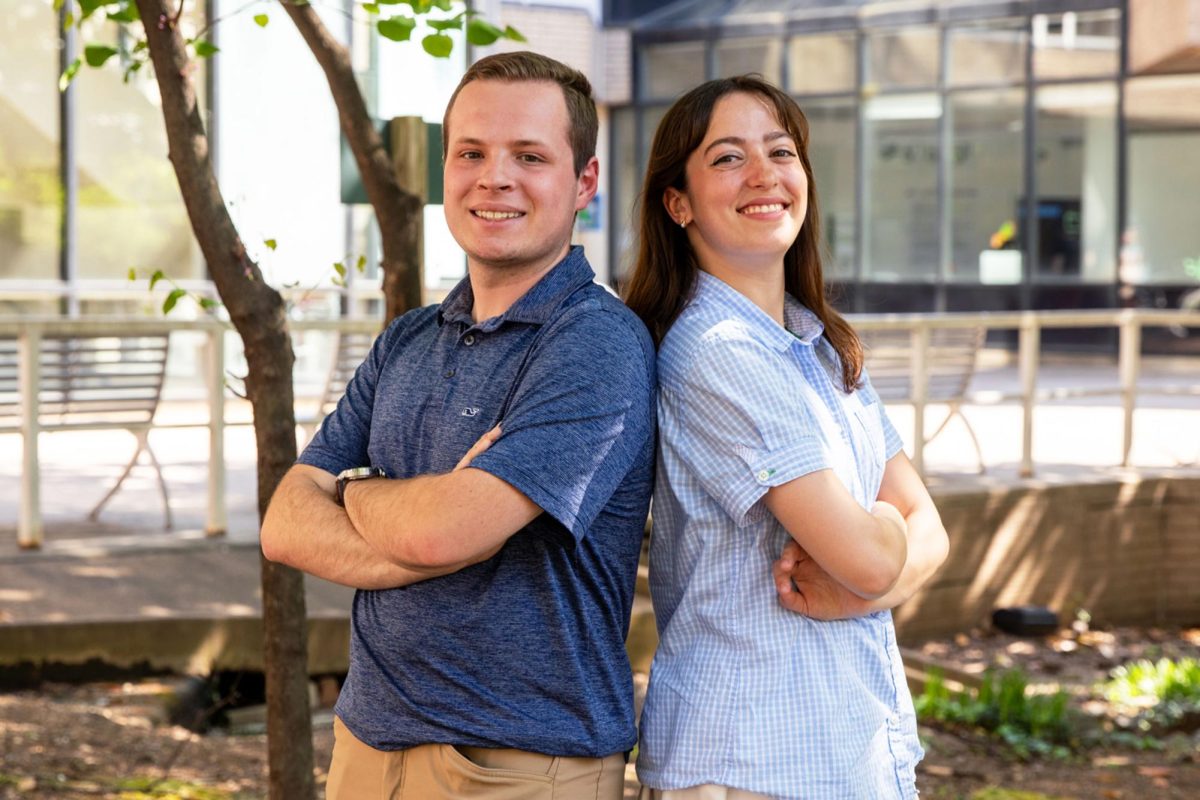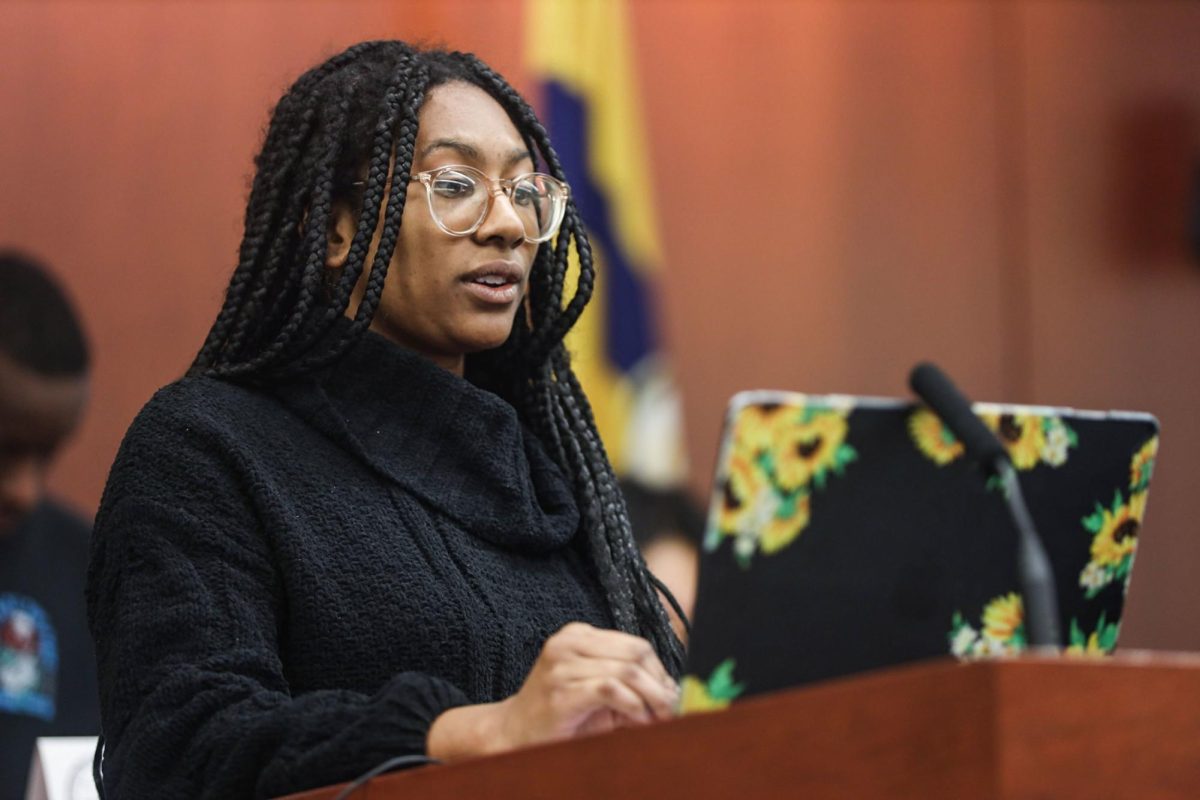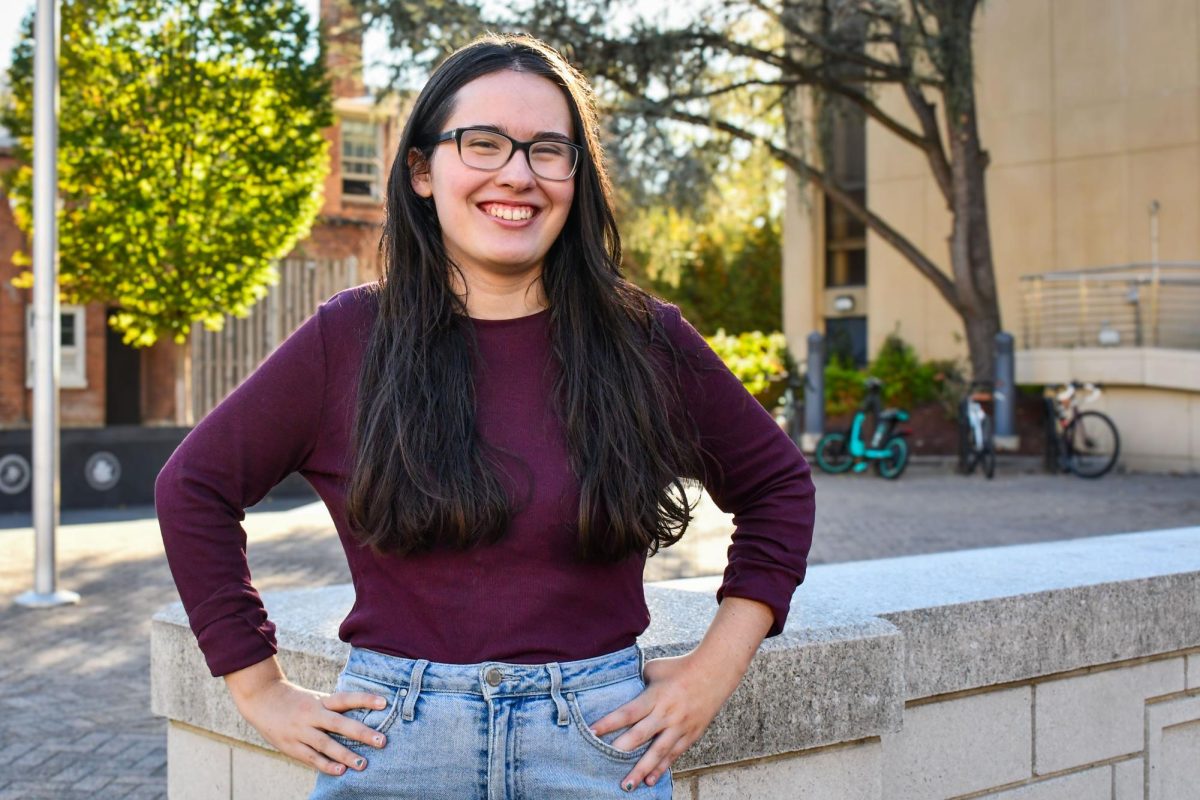Former Student Government Association President Arielle Geismar and Vice President Demetrius Apostolis reflected on their successes and shortcomings from the 2023-24 term with a shared sense of pride and fatigue.
During their terms, Apostolis and Geismar carried out initiatives like the first GW Half Way to Pride Day — a day reserved for celebrating the LGBTQ+ community at GW — and the name change of the Student Government Association, formerly known as the Student Association. Apostolis and Geismar said along with their wins, they failed to obtain U-Pass cards for part-time graduate students and struggled to further advocate for Jewish and Israeli students and Arab, Muslim and Palestinian students because of a lack of interest in joining the councils the SGA created in December.
Geismar said the role of SGA president was a large undertaking, but the work she did to advocate for students was “100 percent worth it.” Geismar ran in 2023 on a platform of raising awareness about the University-Wide Programs Fund and expanding mental health resources for students on campus, prompting her to advocate for the hiring of a mental health focused clinician in the Student Health Center.
In February, senators voted to rename the Student Association to the Student Government Association after students told Geismar that the acronym SA was “harmful to be interacting with” as it has become an abbreviation when referring to sexual assault. She said she is “pleased” at how quickly students have incorporated the new acronym into their vocabulary but said she had to attend multiple meetings with the Board of Trustees to convince them that the old language was upsetting to some community members.
“That process was a lot of meetings and convincing some folks in power that this was actually a change that was needed,” Geismar said. “I think it was tough to kind of have to consistently reiterate something that a lot of students already knew to administration, but we were able to do so.”
Geismar said she also worked to support underrepresented students on campus by advocating for affinity housing for the LGBTQ+ community and hiring a gynecologist in the SHC.
Apostolis, who ran on a platform of increasing dining options and communication between members of the SGA, said he is most proud of the nine months of work he dedicated to the second-annual Career Expo — which provided opportunities for undergraduate students to speak with employers. He said he created the expo after students expressed a lack of knowledge about their possible career options.
“The one thing that I kept hearing from students when I was running for office as a student leader was, ‘I don’t know what to do after GW’ or ‘I don’t know who to connect me to get an internship’ and things like that,” Apostolis said. “So we’re like, ‘How do we change that?’ And so that’s why the career expo started.”
Apostolis said he maintained an “open door policy” throughout his vice presidential term in an effort to be a resource to senators throughout his term.
“While I found this challenging, I think that we honestly did a really good job of making sure that everyone felt comfortable this year,” Apostolis said.
Apostolis said he was unable to obtain U-Pass cards for part-time graduate students by the end of his tenure, a goal he included in his initial campaign platform, because the Metro was unwilling to make changes to their program with GW due to “financial restraints.” All undergraduate students receive U-Pass cards, and the passes are offered to graduate students upon request, but part-time graduate students are ineligible to receive cards.
Apostolis said the biggest challenge he faced as vice president was ensuring every opinion within the SGA was heard while overseeing a staff of about 40 students. He said he had to learn how to balance his own initiatives while navigating the “interpersonal conflicts” that exist within the senate.
Geismar, Apostolis and current SGA President Ethan Fitzgerald created councils in December to provide both Jewish and Muslim students with support after heightened demonstrations on campus and free speech concerns following the outbreak of the war in Gaza. She said as soon as things started “heating up” on campus, she felt as though she couldn’t ignore the topic and needed to “try at a minimum” to advocate for students as protests continued.
“Especially after the events of October 7, we received a lot of requests for SGA to support students on campus,” Geismar said. “We saw a lot of students engage in advocacy and activism and my instinct was to aid and support that.”
The executive order for the councils, sponsored by Geismar and Fitzgerald, stated that the two councils would consist of 10 to 18 students each and would establish cultural programming for Jewish and Israeli students as well as Muslim, Arab and Palestinian students, conduct surveys on “student life, opinions and desires” and meet with University officials to share students’ perspectives.
Geismar said inaction from the committees stemmed from a lack of participation from SGA members despite their “originally conveyed” interest when the SGA voted to create them in December. The SGA requires a commissioner from the legislative and executive branches to act as co-chairs on the councils, but Geismar said the councils never appointed commissioners from the senate because of a lack of interest. She said the councils are currently functioning as an “informal” group until they appoint the needed number of two commissioners per council.
Geismar said each council currently includes fewer than five members, and members have started sharing their experiences about their respective identities on campus during council meetings. She said the council for Jewish and Israeli students created a “Passover at GW” guide, which provided students with information on how to celebrate the religious holiday on campus prior to the week of Passover.
Geismar said the councils have yet to organize a meeting with officials like University President Ellen Granberg, a goal that was included in the initial plan for the advocacy councils.
Fitzgerald, who worked on the legislation to create the councils, said he was “frustrated” with the councils’ lack of conversations with the respective cultural groups on campus during the implementation process. He said next year, he wants to continue the councils and create “working groups” of students to collaborate with University administration on financial transparency and free speech policy concerns.
“I think the premise and the original goal behind the councils was admirable, but as they went into effect, I don’t think it was done in a way that significantly communicated with the relevant stakeholder groups,” Fitzgerald said. “I think that was reflected in the lack of interest, honestly, in filling these groups”
Persia Zurita, who served as the Deputy Secretary of Faith and Religious Justice on Geismar’s executive board, worked with both councils to organize initiatives and lead meetings. She said the existing members of the councils have begun researching how the University has handled the respective demographic groups’ concerns, like acts of antisemitism and Islamophobia on campus, through questionnaires to the student body.
Apostolis, who co-sponsored the order, said the SGA released information about the councils to the student body to increase awareness and hopes the councils have success implementing initiatives in the future.
“It has been a little bit of a struggle and I’m gonna be transparent about that,” Apostolis said. “But I think we’ve been advertising it in every single one of our newsletters, we’ve advertised on Instagram, we’ve done everything we can to make sure that hopefully these became a success.”








